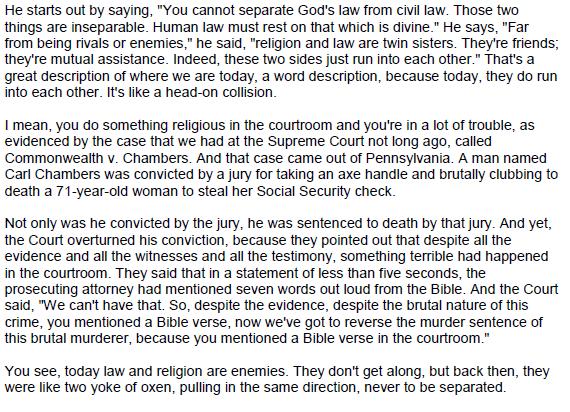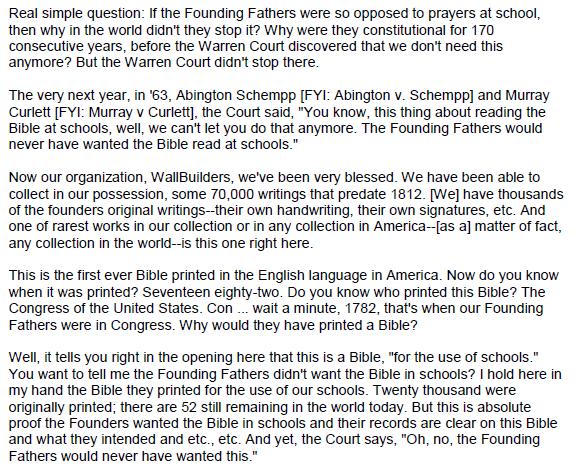On Tuesday’s Steve Deace Show, League of the South board member Michael Peroutka said that Martin Luther King did not call for civil rights in the 1963 “I Have A Dream” speech. During hour one at 28:46, Peroutka said about King:
He was claiming rights for people that were promised in the Declaration of Independence but never in that speech did he actually call for civil rights. He was a champion, I believe, of God-given rights, what has been perverted and now called civil rights, he didn’t call them civil rights, I believe he was a champion of God-given rights. He said in that address, he made it clear that he wasn’t saying the rights he was demanding originated in human government, but he said that a right to equality before the law is ordained by God, and therefore it is a right the civil government has a duty to protect and defend.
Peroutka then noted that King quoted from the Bible in the speech.
Note the claim that King didn’t call for or refer to rights as civil rights. This is, of course, completely false. Anyone who has read any of King’s speeches would know that he constantly called for civil rights, including in the 1963 speech given at the March on Washington for Jobs and Freedom. Here is the segment of the speech where King referred to civil rights:
As we walk, we must make the pledge that we shall always march ahead. We cannot turn back. There are those who are asking the devotees of civil rights, “When will you be satisfied?” We can never be satisfied as long as the Negro is the victim of the unspeakable horrors of police brutality. We can never be satisfied, as long as our bodies, heavy with the fatigue of travel, cannot gain lodging in the motels of the highways and the hotels of the cities. We cannot be satisfied as long as the Negro’s basic mobility is from a smaller ghetto to a larger one. We can never be satisfied as long as our children are stripped of their selfhood and robbed of their dignity by signs stating “For Whites Only”.
King was clearly including himself as a devotee of civil rights. King also spoke of the indignity of discrimination based on skin color (“For Whites Only”). However, an article on Michael Peroutka’s IOTC website titled “Discrimination” and written by Frederick Nymeyer asserts, “We see no reason why men should not discriminate on grounds of religion, race, or nationality, if they wish.”
And then in his letter from a Birmingham jail, King repeatedly calls for civil rights:
I have hope that Mr. Boutwell will be reasonable enough to see the futility of massive resistance to desegregation. But he will not see this without pressure from devotees of civil rights. My friends, I must say to you that we have not made a single gain in civil rights without determined legal and nonviolent pressure. Lamentably, it is an historical fact that privileged groups seldom give up their privileges voluntarily. Individuals may see the moral light and voluntarily give up their unjust posture; but, as Reinhold Niebuhr has reminded us, groups tend to be more immoral than individuals.
In his acceptance speech for the Nobel Peace Prize, King repeatedly called for civil rights, especially noting the importance of the Civil Rights Act. King began his speech:
It is impossible to begin this lecture without again expressing my deep appreciation to the Nobel Committee of the Norwegian Parliament for bestowing upon me and the civil rights movement in the United States such a great honor.
It is jarring to hear a board member of the League of the South invoke Martin Luther King in such a manner. As I have documented previously, those associated with both the League and Peroutka’s Institute on the Constitution revile King on their websites. On Peroutka’s IOTC website, Director of Communications John Lofton proclaims: “Don’t Need Federal Holidays And Certainly Not One ‘Honoring’ The Dishonorable Martin Luther King, Jr. Who Fails His Own Character Test.”
The League’s Michael Hill denigrated King’s civil rights movement in an essay titled: “What Would It Take To Get You To Fight?”
Sadly, our true interests were compromised and sold for a mess of pottage by our so-called leaders a long time ago. For instance, if the South had had real leaders of the people there would have been no second reconstruction known as the civil rights movement.
In another essay, Hill wrote:
The corruption we see today on the Potomac and Wall Street began right away with the Grant administration. Subsequently, we got an empire (the Yanks were just practicing on Dixie), a Federal Reserve system, an Income Tax, the 17th Amendment (which practically destroyed the 10th and States Rights), two World Wars, taken off the gold standard, a Great Depression, another invasion of the South through the civil rights movement (what we Southerners rightly call the Second Reconstruction), the moral rot of the 1960s, sunk up to the neck in the Middle East, three clueless Baby Boomer Presidents (Bill, George, and Barry), the USA Patriot Act and the Department of Homeland Security, a police/surveillance State, and now bankrupted by the Banksters and their political whores in Congress. And I’m supposed to cheer all this on by singing the National Anthem, saluting the Stars and Stripes, and saying the Pledge of Allegiance? No thanks, I’ll pass.
I wonder if Mr. Peroutka agrees with his fellow board member that the civil rights movement was a negative development and a second reconstruction. Perhaps, Mr. Peroutka’s education efforts need to start with his League president.
I doubt such education would help; here is a League of the South press release on King:
Only a sick and reprobate society would elevate Martin Luther King, Jr., and demonize Robert E. Lee and Stonewall Jackson. The former sought to manipulate white guilt and use the power of national government for the ends of black racial advancement; the latter risked their lives on the field of battle to preserve the true principles of Constitutional government and the integrity of their homeland. To King and his ilk (both then and now), the U.S. Constitution and the Bible are nothing more than words to be twisted in service of the liberal vision of the good life. To Lee and Jackson, and those who honor them, they are the wellsprings of Christian liberty and prosperity.
There can be no compromise between the worldviews of those who follow MLK and those who salute Lee and Jackson. Moreover, there is no way that a man can, in good conscience, pay homage to both sides at the same time.
Does Peroutka disagree here with Hill and the League? Did Peroutka not know Hill’s views when he pledged the resources of his family and the IOTC to the work of the League of the South? According to the League press release, King twists the words of the Constitution and Bible to serve a liberal vision. Has Peroutka left the League of the South’s talking points, or is he doing some twisting of his own?
Mr. Peroutka also said that it is shameful to elevate or denigrate someone on the basis of skin color. I agree and recommend that he read the following articles on his own website.
R.L. Dabney on Civil Government (for the relevant portions, read here)
Discrimination (for the relevant portions, read here)

